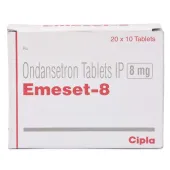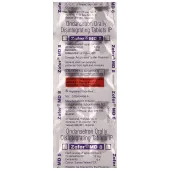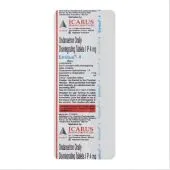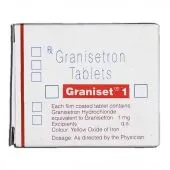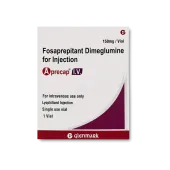Anti Emetic

Antiemetic
Emesis is a medical term that means vomiting. Vomiting is when contents in your stomach come up and exit through your mouth. It is usually accompanied by nausea. Nausea is the feeling of having an upset stomach and generally occurs before the actual vomiting. So why exactly do we vomit? It depends. Emesis can be associated with many different conditions. Read ‘causes of emesis’ to know more about various causes of emesis.
Causes Of Emesis
As mentioned earlier that there are various causes of emesis, here we will be taking a look on some of the most common causes.
-
Emesis may occur due to stimulation of the sensory nerve endings in the GI tract and the pharynx which may be due to medications/drugs.
-
Emesis may also occur due to endogenous emetic substances produced because of the radiation damage or any disease.
-
Disturbance of the vestibular apparatus may also cause emesis.
-
Stimuli to the sensory nerves of the heart and viscera may cause emesis.
-
An increase in the intracranial pressure, nauseating smells, disgusting experiences etc can also cause emesis.
-
Sometimes emesis and nausea occur due to PONV or postoperative nausea and vomiting as a result of the surgery and general anesthesia.
-
Emotional stress also causes emesis.
Signs Of Emesis
Nausea and vomiting commonly occur in those with infections ranging from influenza to gastroenteritis. Symptoms that occur with nausea and vomiting include:
-
abdominal pain
-
diarrhea
-
fever
-
lightheadedness
-
vertigo
-
rapid pulse
-
excessive sweating
-
dry mouth
-
decreased urination
-
chest pain
-
fainting
-
confusion
-
excessive sleepiness
-
vomiting blood
Adverse Effects On Body
Excessive vomiting may cause electrolyte imbalances. It may also cause the erosion of the inner cell lining of the esophagus. In severe cases of vomiting such as in bulimia nervosa, vomiting may lead to the destruction of tooth enamel due to the acidity of the vomit.
Prevention Of Emesis
The following tips will help you to prevent yourself from throwing up:
1. Avoid being in places with strong odors and bad smell
2. if you feel like vomiting place a cool cloth on your face or sit in front of a fan
3. divert your mind to something else, like watch TV or listen to music
4. Avoid eating anything if you feel bloated or have a severe stomach ache, rather take a nap to rest your body
Home Remedies For Emesis
There are some effective home remedies available for emesis which is discussed below.
-
Ginger: Being good for the digestive system, ginger works as a natural antiemetic for preventing emesis. You can try ginger tea with a little honey or even eat fresh slices of ginger for effective results.
-
Rice Water: Rice water is beneficial in reducing the act of emesis, especially those which are caused due to gastritis. Just boil one cup of rice in one and a half cup of water and strain the solution for drinking the rice water.
-
Mint: Mint is also known to be effective in treating emesis. You can prepare mint tea and take the best benefits. Add mint leaves in one and a half cup of boiling water and allow it to steep and strain the water. Then drink the mint tea for the best benefits.
-
Cinnamon: Cinnamon or Dalchini is also known to be helpful in calming the stomach and also treat nausea and emesis. You can add one and a half teaspoon of cinnamon powder in boiling water and allow it to steep for a few minutes and then strain the water before drinking it. However, this home remedy may not be suitable for pregnant women
-
Vinegar: One more home remedy for emesis, upset stomach, etc. is vinegar. It calms the stomach and helps detoxification. You can simply mix one tablespoon of apple cider vinegar and on a tablespoon of honey in a glass of water and drink it. You can repeat it as many time as required.
-
Fennel: It is also known that fennel seeds are effective in digestion and ease nausea. Because of the antimicrobial properties, fennel can be used in treating emesis. Simply chewing fennel seeds would help.
-
Clove: Chewing some cloves or taking tea made of few cloves can be effective in treating emesis or vomiting.
-
Cumin: One of the best home remedies for treating emesis is cumin. It is most effective when emesis or nausea is caused due to digestive problems. You can mix one and a half tablespoons of cumin seeds in warm water and drink it for the essential results.
Common Medications
-
Promethazine(Phenergan),
-
Prochlorperazine (Compazine),
-
Droperidol (Inapsine)
-
Metoclopramide (Reglan)
-
Ondansetron (Zofran) etc.
If you are planning to buy anti-emetic online, then make sure you buy them only from a reputed online drugstore.
Drug Interaction
Nausea is one of the most common side effects of many drugs, including-
Anti-cancer drugs used for chemotherapy
-
Narcotic pain medications
-
Anti-inflammatory medications
-
Steroids
-
Increased pressure within the skull: Any illness, discomfort or injury that increases the pressure within the skull can cause vomiting example in tumors and meningitis.
-
Lethal stimulus: in many cases, certain smells or sounds may initiate the vomiting that originates in the brain. In other cases, certain sights including any emotional shock or pain may also initiate throwing up.
-
Illness related to heat: example extreme sunburn, heat exhaustion, or dehydration
-
Diabetes: People with diabetes may develop vomiting as well as nausea due to the failing of the stomach to empty itself called gastroparesis.
-
Diseases or illness: Many complaints associated with the abdominal organs can produce the symptoms of vomiting. These include
1. Hepatitis
2. Kidney problems
3. Gallbladder disease
4. Pancreatitis
5. Some forms of cancer
6. Heart attack
7. Lung infections like pneumonia and bronchitis


